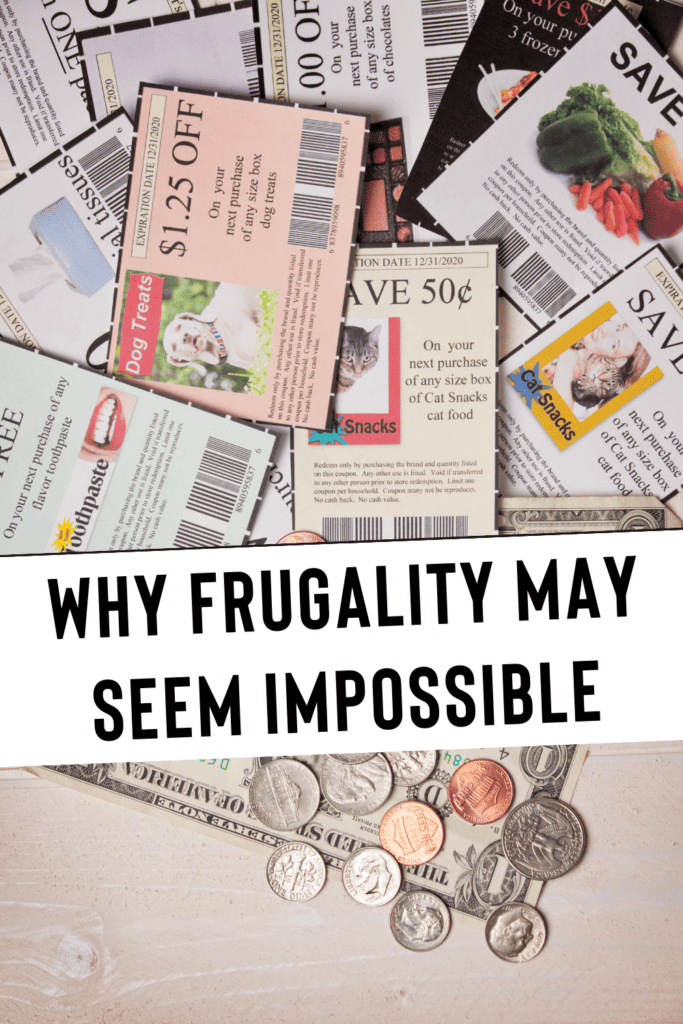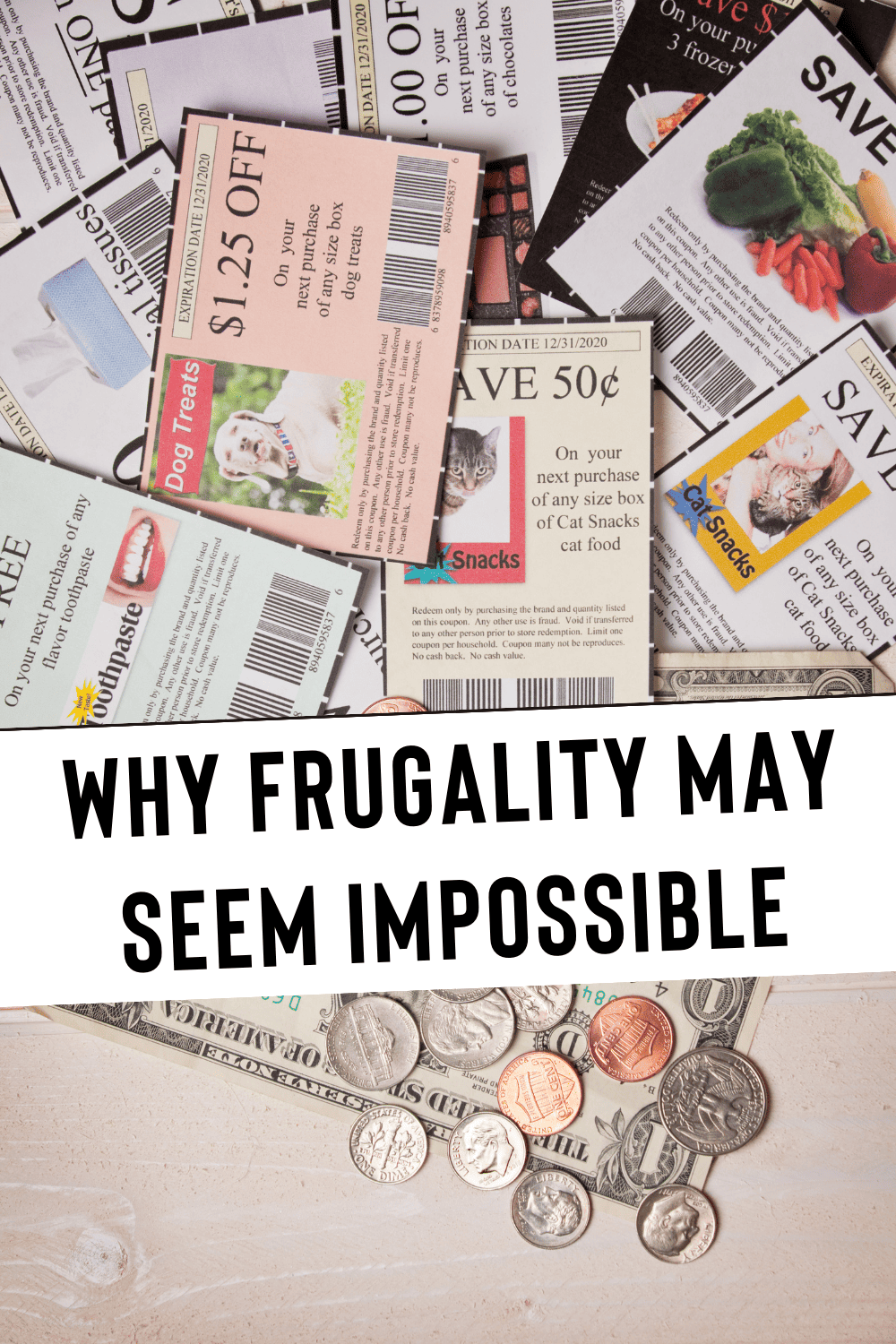Why Frugality May Seem Impossible
This post may contain affiliate links which might earn us money. Please read my Disclosure and Privacy policies hereFrugality may seem impossible in a world where temptation and consumerism are at every turn. However, it is important to recognize that frugality goes beyond mere penny-pinching. It is about adopting a mindful and intentional approach to spending, prioritizing needs over wants, and finding alternative ways to achieve our goals without breaking the bank.
Many individuals strive to be frugal in their personal finances, aiming to save money, reduce debt, and live a more sustainable lifestyle. However, certain circumstances and factors can make practicing frugality challenging, if not impossible.

Definition of Frugality
Defining what it means is essential to understand why frugality may be difficult to achieve. Frugality is the practice of being economical or thrifty in managing resources, often involving a conscious effort to reduce unnecessary expenses and lead a simpler lifestyle. It requires making deliberate choices about spending and prioritizing essentials over luxuries.
Importance of Frugality in Personal Finance
Frugality in personal finance is crucial for several reasons. It allows individuals to save money, build an emergency fund, pay off debts, and invest for the future. It promotes financial independence, stability, and resilience during difficult times. Furthermore, frugality can reduce personal and environmental waste, encouraging a more mindful consumption approach.
However, several challenges can hinder one's ability to practice frugality, including:
- Financial Constraints: Limited income or high expenses can make cutting back on non-essential spending difficult.
- Social Expectations: Peer pressure and societal norms can create pressure to spend money on unnecessary items or experiences.
- Emotional Spending: Emotional triggers and impulsive behavior can lead to overspending and difficulty in sticking to a frugal lifestyle.
- Advertising and Marketing: The constant bombardment of advertisements and marketing tactics can make it challenging to resist spending.
- Lifestyle Factors: Certain lifestyle choices, such as living in an expensive area or having dependents, can add financial burdens that make frugality more difficult to achieve.
While frugality can be challenging in certain situations, it is still possible to incorporate mindful spending habits and make conscious choices to prioritize financial well-being. Individuals can still strive towards a more frugal lifestyle by being aware of these challenges and finding strategies to overcome them.
Limitations of Frugality
Frugality, the art of saving money and being mindful of expenses, may seem like the ultimate goal for many individuals seeking financial stability. However, it is important to acknowledge that frugality has limitations and may not always be achievable in certain circumstances.
The Reality of Wear and Tear
One of the key limitations of frugality is the unavoidable reality of wear and tear on essential items and possessions. While it is possible to extend the lifespan of certain belongings through careful maintenance and repair, there comes a point when replacement is inevitable. This can apply to appliances, vehicles, furniture, and even clothing.
In such cases, investing in quality items may ultimately save money in the long run despite the higher upfront cost. Frugality alone may not always be sufficient in preventing extensive wear and tear.

Unforeseen Expenses and Financial Stability
Another challenge to frugality is the presence of unforeseen expenses that can arise unexpectedly, putting a strain on even the most carefully planned budgets. Emergencies, medical bills, home repairs, and car accidents are just a few circumstances that can quickly deplete savings and challenge frugal habits.
In these situations, it may be necessary to tap into savings or explore other financial resources to address immediate needs. Maintaining a balance between frugality and having a financial safety net is crucial for long-term stability.
While frugality is a commendable practice, it is important to recognize its limitations. Understanding the reality of wear and tear on possessions and the potential for unforeseen expenses allows individuals to approach their finances with a more well-rounded perspective. By incorporating careful planning, saving, and investing wisely, individuals can strive for frugality and financial stability.
Frugality vs. Perfection
In a consumer-driven society, practicing frugality can sometimes seem impossible. The constant pressure to have the latest gadgets, trendy clothes, and luxurious experiences can make it challenging to prioritize saving and spending wisely. However, it's essential to understand that frugality doesn't mean sacrificing everything to achieve perfection.
The Creative Side of Frugality
Embracing frugality can actually spark creativity and resourcefulness. When faced with limited financial resources, individuals often find innovative ways to meet their needs and desires without breaking the bank. Whether repurposing old items, finding affordable alternatives, or DIY projects, being frugal encourages thinking outside the box and finding unique solutions.
Finding a Balance between Saving and Spending
Frugality does not have to be an all-or-nothing approach. It's important to strike a balance between saving money and enjoying life. It's okay to treat yourself occasionally to things that bring you joy as long as they fit within your budget and financial goals. The key is to make mindful choices and prioritize your long-term financial well-being.
By adopting a frugal mindset, individuals can free themselves from the relentless pursuit of perfection and find contentment in a more sustainable and financially responsible lifestyle. It's about making conscious decisions, being aware of one's spending habits, and finding creative ways to stretch every dollar.
While achieving absolute frugality may be challenging in today's consumer-driven world, embracing a more intentional and resourceful spending approach can provide financial security and peace of mind.

The Benefits of Frugality
Frugality is often seen as a virtue, with countless articles and books extolling it. Living a frugal lifestyle can save money, reduce debt, and achieve financial goals. However, it is important to acknowledge that frugality may not always be possible or practical for everyone.
Financial Freedom and Security
Frugality can lead to financial freedom and security. Individuals can save and invest more by cutting unnecessary expenses and living within one's means. This can help create an emergency fund, pay off debts, and build wealth over time. With a solid financial foundation, individuals can experience less stress and worry about their financial future.
Enhanced Quality of Life
By adopting a frugal lifestyle, individuals can prioritize spending on the things that truly matter to them. This can lead to an enhanced quality of life as they focus on experiences, relationships, and personal growth rather than material possessions.
Frugality encourages mindfulness and intentionality, helping individuals make conscious decisions about spending their time and money.
However, it is essential to recognize that frugality may not be feasible for everyone. Some individuals may have financial obligations or circumstances that make saving or reducing expenses difficult.
Also, certain expenses are necessary for basic needs and well-being, and cutting them may not be a realistic or advisable option.
Frugality can offer many benefits, but it is important to acknowledge that it may not always be possible or practical for everyone.
Each individual's financial situation is unique, and finding the right balance between saving and spending is key to achieving financial well-being and an enhanced quality of life.
While frugality is an achievable goal, it may be challenging to achieve for various reasons. However, it is essential to acknowledge the realistic limitations and embrace the positive impact of frugal living.
Acknowledging the Realistic Expectations of Frugality
Frugality can be difficult to sustain due to several factors:
- Cost of Living: The increasing cost of basic necessities such as housing, healthcare, and education can make it challenging to save money.
- Individual Circumstances: Each person's situation and financial responsibilities will vary, making it harder for some to cut back on expenses.
- Psychological Factors: The desire for instant gratification and societal pressures to continuously consume can hinder frugal habits.
Embracing the Positive Impact of Frugal Living
While achieving complete frugality may be impossible for everyone, making conscious efforts to adopt frugal habits can still have a positive impact:
- Financial Security: Spending wisely and saving money can provide a safety net during unexpected circumstances and help achieve long-term financial goals.
- Sustainability: Frugal living promotes sustainability by reducing waste, conserving resources, and making environmentally friendly choices.
- Minimalism: Embracing frugality encourages a simpler and clutter-free lifestyle, resulting in reduced stress and increased focus on what truly matters.
It is important to approach frugality with a realistic mindset and understand that everyone's journey towards financial well-being will vary. By acknowledging the limitations and embracing the positive impact of frugal living, individuals can strive for a more balanced and fulfilling life.









